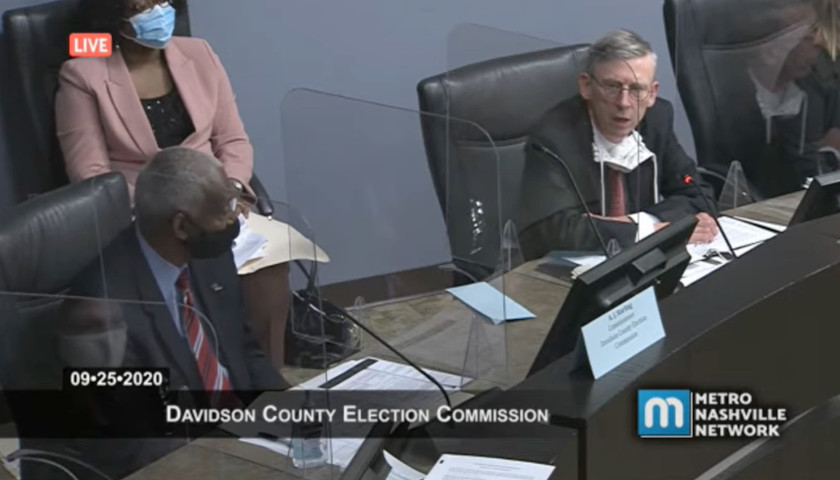The 2004 Tennessee Supreme Court decision in City of Memphis v. Shelby County Election Commission that found the “Commission exceeded its authority by refusing to place Referendum Ordinance No. 5072 on the November 2, 2004, ballot based upon the State Election Coordinator’s opinion that the Ordinance is unconstitutional,” may blow a major hole in Metro Nashville Legal Director Bob Cooper’s argument made to to the Davidson County Election Commission at its September 25 meeting that “the commission’s role here is not purely ministerial,” and that a 2004 Tennessee Supreme Court decision “said that the commission can consider the form of a referendum petition and suggested that it could review the petition’s facial or procedural legality.”
On Monday, Cooper – who served as Tennessee Attorney General from 2006 to 2014 and is a graduate of Yale Law School – issued a legal opinion that said, in part, that “the proposed charter amendment [the Nashville Taxpayer Protection Act referendum that would, among other things, repeal the recently enacted 34 percent property tax increase] is not legal and enforceable” and is “defective in form and conflicts with Tennessee Constitution and state and local laws in [various] ways.”
Cooper noted that the Davidson County Election Commission decided in a three to two vote at its September 25 meeting to “seek a declaratory judgment from Davidson County Chancery Court on the proposed amendment’s legal validity and set a conditional referendum date for December 15.”
“The Davidson County Election Commission has recruited a legal team to sue the citizens’ group Americans for Prosperity-Tennessee (AFP-TN) for its December ballot tax cut petition. Former Tennessee Supreme Court Justice Bill Koch will serve as lead counsel,” as The Tennessee Star reported.
The Davidson County Election Commission is scheduled to meet again this Tuesday afternoon to make a final determination as to whether the proposed referendum will be placed on the ballot.
The Tennessee State Supreme Court’s ruling in that 2004 case, City of Memphis v Shelby County Election Commission, came to exactly the opposite conclusion from Cooper’s claim before the Davidson County Election Commission meeting on September 25 that, “the commission’s role here is not purely ministerial.”
“In this expedited appeal, this Court is asked to decide whether the Shelby County Election Commission exceeded its authority by refusing to place Referendum Ordinance No. 5072 on the November 2, 2004, ballot based upon the State Election Coordinator’s opinion that the Ordinance is unconstitutional. We hold that the Shelby County Election Commission exceeded its authority in refusing to place the measure on the ballot,” the decision stated:
The trial court in this case accurately characterized the Commission’s duties as ministerial. The Commission and the Coordinator respectively perform important functions vital to the maintenance and advancement of our political system. Nonetheless, as ministerial officers, the Commission and the Coordinator have limited discretion.
Black’s Law Dictionary defines a “ministerial officer” as “[o]ne who performs specified legal duties when the appropriate conditions have been met, but who does not exercise personal judgment or discretion in performing those duties.”
A “strictly ministerial duty” is defined as: “A duty that is absolute and imperative, requiring neither the exercise of official discretion nor judgment.” Id. at 522.3
These definitions illustrate how, as ministerial officers performing ministerial acts, the Commission and the Coordinator must implement the election laws, not determine the substantive constitutionality of ballot measures.
Without question, the Commission and the Coordinator have certain statutorily prescribed ministerial duties that allow – indeed require – them to do such things as examine ballot initiatives to determine whether signature requirements are met, determine whether submissions are timely, and determine whether candidates have properly qualified to be placed on the ballot. See Tenn. Code Ann. § 2-1-101 through -216 (2003) et seq.
However, these statutes do not require or even permit the Commission to refuse to include a referendum question on the ballot because the Commission believes the question to be substantively unconstitutional. See Tenn. Code Ann. §§ 2-12-101 through 2-12-216 (delineating the duties of the Commission).
The Commission contends that it has the power and duty to make an “initial determination” whether the law authorizes the acts it is required to perform. This contention is true with respect to the Commission’s performance of its ministerial duties.
However, it is inaccurate to say that the Commission has the power and duty to perform an initial or cursory review of the substantive constitutionality of measures to be placed on the ballot for referendum. Determining the substantive constitutionality of such measures is a function reserved for the judicial branch of government.
Furthermore, the Coordinator, an appointed, ministerial official, also lacks the statutory authority to forbid the inclusion of a referendum question based upon the Coordinator’s opinion that the measure is substantively unconstitutional. The Coordinator’s statutory duty to approve the “form of the ballot” does not provide authority to determine the substantive constitutionality of referendum questions, like the Ordinance at issue in this case.
At the beginning of the September 25 meeting, Cooper said, “The commission’s role here is not purely ministerial. The commission has the authority to review the legal sufficiency of a referendum petition. In 2004, the Tennessee Supreme Court ruled that a county election commission has limited discretion. The court said that the commission can consider the form of a referendum petition and suggested that it could review the petition’s facial or procedural legality.”
(You can see Cooper’s remarks starting at the 3:18 mark of the video below of the meeting)
Cooper, however, provided no citation for the 2004 Tennessee Supreme Court case he mentioned during his opening comments.
The Tennessee Star asked Cooper if he could provide the case citation, but he has not responded to that request yet.
The Nashville Davidson County Metro Charter makes it explicitly clear that when it comes to election questions such as the Nashville Taxpayer Protection Act referendum, the Davidson County Election Commission’s duties are purely ministerial after verifying that a sufficient number of signatures have been obtained to place a referendum on the ballot:
Sec. 19.01. – Amending Charter by resolution of council or petition and popular vote.
This Charter may be amended subsequent to its adoption in the following manner:
An amendment or amendments may be proposed (1) by the adoption of a resolution by the council favoring the same and submitting it or them to the people for approval. The affirmative vote for adoption of such resolution in the council shall be not less than two-thirds of the membership to which the council is entitled, and such resolution when adopted need not be submitted to the mayor for his or her approval; or (2) upon petition filed with the metropolitan clerk, signed by ten (10) per cent of the number of the registered voters of Nashville-Davidson County voting in the preceding general election, the verification of the signatures to be made by the Davidson County Election Commission and certified to the metropolitan clerk. Such resolution or petition shall also prescribe a date not less than eighty (80) [days] subsequent to the date of its filing for the holding of a referendum election at which the electorate of the metropolitan government will vote to ratify or to reject the amendments proposed.
The metropolitan clerk shall immediately certify to the county commissioners of election copy of such resolution or petition and it shall thereupon be the duty of said commissioners of election to hold a referendum election with respect thereto.
The ballot shall be prepared so as to set forth a brief description of the amendment worded so as to convey the meaning of said amendment, said description to be set forth in the original amendatory resolution, that the language of each amendment in full be posted conspicuously in the voting place and be published in a local newspaper, numbered as the same is numbered in the resolution of the council or in the petition, and to provide the voters a choice to vote “For Ratification” and “Against Ratification” of each proposed amendment.
Each proposed amendment shall be ratified when a majority of the votes cast at the special referendum election shall be in favor of ratification and each proposed amendment shall be rejected when a majority of said votes shall be against ratification. Notice of said referendum election shall be given as provided by Tennessee Code Annotated, section 2-1808*, and the costs of said election shall be paid out of the general funds of the metropolitan government.
In his presentation to the election commission, Cooper subsequently referenced a 2017 Tennessee Supreme Court decision, but again did not provide the case citation.
“This holding [in 2004] was affirmed in 2017, when the Tennessee Supreme Court said that election commissions ‘are not strictly ministerial bodies’ and that ‘the election code clearly gives county election commissions the authority to perform functions that are discretionary in addition to their ministerial duties,'” Cooper added.
As best The Star can determine, the only 2017 Tennessee Supreme Court case that dealt with the duties of a county election commission was McFarland v Pemberton, which dealt with the question of a county election commission’s authority to remove an unqualified candidate from the ballot, not with the question before the Davidson County Election Commission, as to the constitutionality of the referendum.
In that case, the court ruled:
This appeal addresses the authority of a county election commission to make a factual determination on the qualifications of a candidate seeking to be placed on a ballot. In this case, the defendant filed a petition to run for circuit court judge. A registered voter filed a complaint with the county election commission arguing that the defendant did not reside in the judicial district and, consequently, should not be placed on the ballot.
The election commission held a hearing on the complaint and voted unanimously to place the defendant on the ballot. The defendant won the election. The plaintiff, the defendant’s defeated opponent in the election, filed this election contest based solely on the defendant’s alleged failure to meet the residency requirement. The trial court and the Court of Appeals dismissed the complaint. Both held that the substance of the plaintiff’s complaint was a challenge of the election commission’s administrative decision on the defendant’s residency, governed by the 60-day statute of limitations in Tennessee Code Annotated section 27-9-102 for a petition for a writ of certiorari.
Because the complaint was not filed within sixty days of the county election commission’s final decision, it was dismissed as untimely. On appeal to this Court, we hold that, by necessary implication, the county election commission had the authority under Tennessee’s election statutes to hold a quasi-judicial hearing to make a factual determination to resolve the voter’s complaint challenging the defendant’s residency. We also hold that the county election commission’s decision to certify the defendant as a qualified candidate on the ballot was a final administrative decision subject to judicial review by common-law writ of certiorari.
The plaintiff, who had actual notice of the county election commission’s actions, was “aggrieved” by the election commission’s final administrative decision within the meaning of Tennessee Code Annotated section 27-9-101 and, thus, had standing to file a petition for a writ of certiorari. Though the plaintiff’s complaint was styled as an election contest, the gravamen of the complaint is a request for judicial review of the county election commission’s decision, reviewable through a petition for a writ of certiorari and subject to the 60-day statute of limitations for such a petition. Because the plaintiff’s complaint was filed well after expiration of the 60-day period, we affirm the lower courts’ dismissal of the complaint as untimely.
The Star contacted Metro Legal Director Cooper for comment but did not received a response.
Nashville attorney Jim Roberts, who along with Americans for Prosperity for Tennessee organized the 4 Good Government group that secured the signatures for the Nashville Taxpayer Protection Act charter amendment to be placed as a referendum before the people offered his comments to The Star.
“Bob Cooper seems to believe that somehow the Election Commission has a lot more authority than it does. He’s just making that up, for lack of a better term. Tennessee law is pretty clear. I was already familiar with City of Memphis v Shelby County Election Commission. In that case the Supreme Court said that election commissions don’t have the authority to make determinations about the legality of a particular ballot initiative. They don’t have that kind of authority,” Roberts said Sunday.
“They would be acting in a judiciary capacity if they tried to play lawyer, and they’re not allowed to do that. But he [Cooper] says it anyway. Because that is what he does.”
As The Star reported on Monday, Cooper also cited a 1949 Tennessee Supreme Court decision, Cummings v. Beeler, in his September 25 testimony before the Davidson County Election Commission:
The Tennessee Star has obtained a copy of the Tennessee Supreme Court’s ruling in that case, which can be read in this story below. Cummings was the Tennessee Secretary of State at the time, and the plaintiff in the lawsuit. Beeler was the Tennessee Attorney General at the time and one of the defendants in the lawsuit. Another defendant was the Davidson County Election Commission.
“The purpose of the suit was to have the Court declare the rights, status, duties and obligations and other legal relations of the parties as affected by Chapter 49 of the Public Acts of 1949. The bill further averred that the Statute is constitutional and asked that the Court so declare,” the Tennessee Supreme Court said in its 1949 decision, adding:
The Election Commissioners, who are parties defendant to this suit have certain specific duties to perform under the Act. They allege in their answer that there are serious doubts as to the validity of Chapter 49 of the Public Acts of 1949 and that these doubts were greatly strengthened by the published opinion of the Attorney General of Tennessee, rendered prior to the passage of the Act in question. It seems to us that the question is not merely a theoretical question. We have an Act of the legislature mandatorily requiring a State official to spend public funds to hold a special election on November 8, 1949.
The Secretary of State is required to spend this State money. He must either obey the mandatory provisions of this law which the Attorney General has previously publicly declared as unconstitutional or he must disregard the law entirely. If the Secretary of State decides to follow the mandates of the statute and spend the public funds and then it develops that the Attorney General was correct in his opinion in holding that the law was invalid and unconstitutional, the Secretary of State would have spent public funds under the authority of a law which was illegal and without effect. This expenditure would have been made in face of the declared official opinion of his official legal adviser that the law was invalid and unconstitutional. It would therefore clearly appear that the Secretary of State has a real interest, officially, in determining whether or not the legislation is valid before spending these public funds.
The Star asked Roberts if Cooper understands the law.
“Well, he doesn’t care. He’s desperately trying to keep this very popular ballot initiative off the ballot. He will do anything. He will say anything. He will waste whatever money. He doesn’t care. Even if it costs $10 million he’ll spend it just to keep this off the ballot.”






Nashville continues to follow the lead of the rest of the cities in the USA who are under the control of Democrat Mayors, Councilmen, and their bureaucrat appointed lackeys. The entire Cooper family has been corrupt from childhood, and probably for several generations back.
Want an example of dictatorship, socialism, and Marxism? Look no further than the Cooper family and their power grab, their shunning of the will of the voters, and the lies they spew to protect themselves.
Want Nashville to be the next Los Angeles or San Francisco? Let the Coopers have their way.
Nashville is NOT Tennessee, we don`t believe in that stuff.
does metro have a recall statute. if so perhaps the energy and money would be better spent on that.
Bob cooper went to Yale Law school! I think he would have been better served going to UT school of Law, at least he could reference correctly the TN supreme court case supporting the referendum. Not impressed where you go to school, more impressed in how you use your skills to help your clients! Starts with correctly appraising your case. Please file a bar complaint against Bob and ask for personal restitution for his bad arguments that has cost Davidson County residents tax money to hire another Democrat to represent the election commission based on incorrect information from Bob Cooper. Election Commission please put the referendum on the ballet and let the people speak the final word on raising our property taxes by 34%. Did you get a 34% pay raise last year?
Why is Chicken Coop fighting tooth and nail to keep this tax hike in place? Other than Obamacare, I’ve never seen a politician fight so hard to give the people something they don’t want.
Bob Cooper served under Bredesen. Was there any doubt he would find a way to conspire with Mini Cooper and Comrade Mendes to stop the tax revolt?
And, I doubt any Chancery Court judge will rule against the Mayor. Sad that Nashville citizens cannot trust the Metro Government to do anything but play politics.